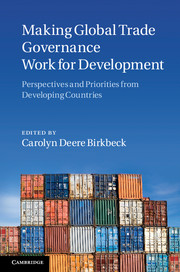 Making Global Trade Governance Work for Development
Making Global Trade Governance Work for Development from Part III - Strengthening multilateralism
Published online by Cambridge University Press: 07 September 2011
Aid for Trade is an important development initiative. It gives concrete expression to the objective of securing greater developing country participation in international trade, which is vital for promoting the global public good of a rules-based international trading system. Yet the complicated arrangements for the ‘governance’ and implementation of the Aid for Trade initiative make it challenging for developing countries to access the available resources. In its current form, Aid for Trade governance is at best ambivalent when it comes to the declared mission of supporting developing countries to build trade capacity, overcome supply side constraints and profit more fully from the international trading system. Moreover, there is a deficit in the institutional arrangements regarding access to and predictability of Aid for Trade resources. This is reflected in the skewed distribution of Aid for Trade across countries: in 2008, out of over a hundred eligible countries, the top twenty recipients captured 70 per cent of all Aid for Trade commitments (OECD 2010a).
The objectives of this chapter are twofold. First, it outlines the institutional arrangements for the governance and implementation of Aid for Trade. Second, it argues that as Aid for Trade has evolved, the key governance principle guiding implementation has become the mutual accountability of donors and beneficiaries, whereas equally important principles of access to and predictability of resources are much less prominent.
To save this book to your Kindle, first ensure no-reply@cambridge.org is added to your Approved Personal Document E-mail List under your Personal Document Settings on the Manage Your Content and Devices page of your Amazon account. Then enter the ‘name’ part of your Kindle email address below. Find out more about saving to your Kindle.
Note you can select to save to either the @free.kindle.com or @kindle.com variations. ‘@free.kindle.com’ emails are free but can only be saved to your device when it is connected to wi-fi. ‘@kindle.com’ emails can be delivered even when you are not connected to wi-fi, but note that service fees apply.
Find out more about the Kindle Personal Document Service.
To save content items to your account, please confirm that you agree to abide by our usage policies. If this is the first time you use this feature, you will be asked to authorise Cambridge Core to connect with your account. Find out more about saving content to Dropbox.
To save content items to your account, please confirm that you agree to abide by our usage policies. If this is the first time you use this feature, you will be asked to authorise Cambridge Core to connect with your account. Find out more about saving content to Google Drive.